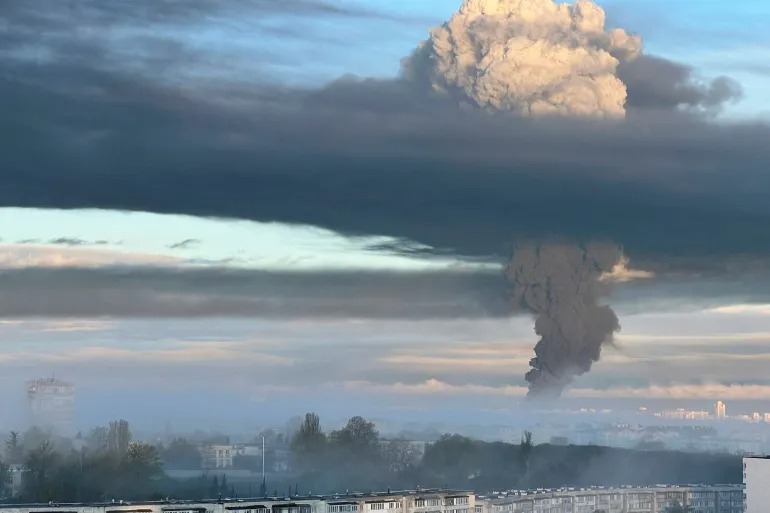Russia has accused Ukraine’s Western allies, particularly the United States and the United Kingdom, of playing a role in the recent missile attack on the Russian Black Sea Fleet’s headquarters in Crimea. Moscow alleges that Western intelligence means, including NATO satellite assets and reconnaissance planes, were employed in planning and executing the attack. These allegations have escalated tensions between Russia and the Western world, casting a shadow of doubt on international efforts for peace.
Covert Western Assistance
Amidst growing turmoil in the region, Moscow’s Foreign Ministry spokesperson, Maria Zakharova, made a damning statement on Wednesday, asserting that Western powers had actively participated in the attack on the Russian Black Sea Fleet’s headquarters. Zakharova argued that the attack had been meticulously planned using Western intelligence resources, highlighting the involvement of NATO satellite assets and reconnaissance planes. She went further to claim that the United States and British security agencies had provided advice and closely coordinated with Ukraine in carrying out this operation.
Accusations of a Hidden Agenda
According to Zakharova, the purpose of such attacks was not only to strike at Russian military assets but also to divert attention from Ukraine’s failed counteroffensive attempts. Zakharova suggested that these actions were calculated to instill fear and panic within Russian society. This latest accusation joins a long list of Russian claims, asserting that the U.S. and its NATO allies have actively contributed to the conflict in Ukraine, supplying weapons and intelligence information to Kyiv, and aiding in planning attacks on Russian facilities.
The Storm Shadow Missiles Connection
Unconfirmed reports suggest that the missile attack on the Black Sea Fleet’s headquarters in Sevastopol involved Storm Shadow missiles. These missiles, reportedly supplied by the United Kingdom and France to Ukraine, raise questions about the extent of Western support for Ukraine’s military actions against Russia. Such developments add to the complexity of the situation and heighten concerns of escalating conflict in the region.
As tensions mount, Dmitry Medvedev, the deputy head of Russia’s Security Council, expressed apprehensions about the recent arrival of US-made Abrams battle tanks in Ukraine. Additionally, the promise of supplying Kyiv with long-range ATACMS missiles by Washington further raises the specter of a direct conflict between NATO and Russia, a scenario that could have dire global consequences.
Friday’s missile attack on the Black Sea fleet’s headquarters marks the latest in a series of strikes on targets within the annexed Crimean Peninsula, which Russia controversially seized from Ukraine in 2014. Crimea has been pivotal in Russia’s invasion of Ukraine, making it a hotspot for confrontations between Russian and Ukrainian forces. Ukraine remains steadfast in its commitment to reclaim the peninsula under Kyiv’s control, escalating the stakes in this ongoing crisis.
Ukraine, for its part, claims that the missile strike inflicted significant damage on the main building of the fleet’s headquarters, resulting in the loss of 34 officers, including Admiral Viktor Sokolov, the fleet’s commander. Shockingly, despite reports of his demise, Sokolov was seen participating in a Russian defense officials’ meeting and was later purportedly engaging with journalists in Sevastopol.
The Institute for the Study of War (ISW), based in Washington, DC, has scrutinized these developments. While Russian media attempts to provide “proof” of Sokolov’s survival, ISW remains cautious, emphasizing the need for further verification. The Kremlin and Russian Ministry of Defense have remained conspicuously silent on this matter, refraining from confirming Sokolov’s status. In contrast, Ukraine’s Special Operation Forces claim that Sokolov was among the casualties of the missile strike and are actively working to verify these reports, especially in light of the conflicting evidence.
In a region already fraught with geopolitical tension, these allegations of Western involvement in the attack on the Russian Black Sea Fleet’s headquarters have added fuel to the fire. The situation remains fluid, with international observers closely monitoring developments, apprehensive of the consequences of escalating hostilities in this volatile region.















